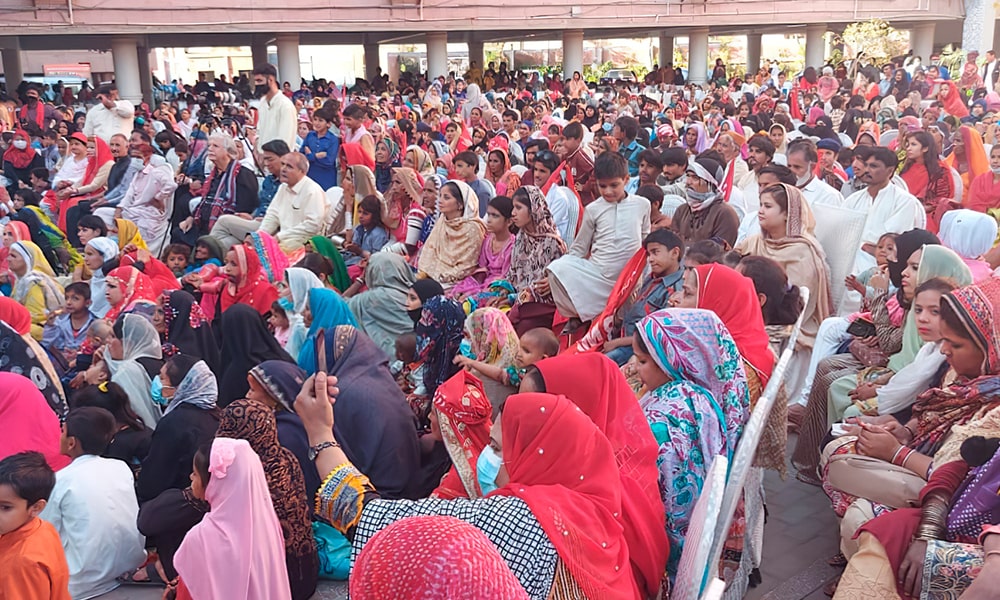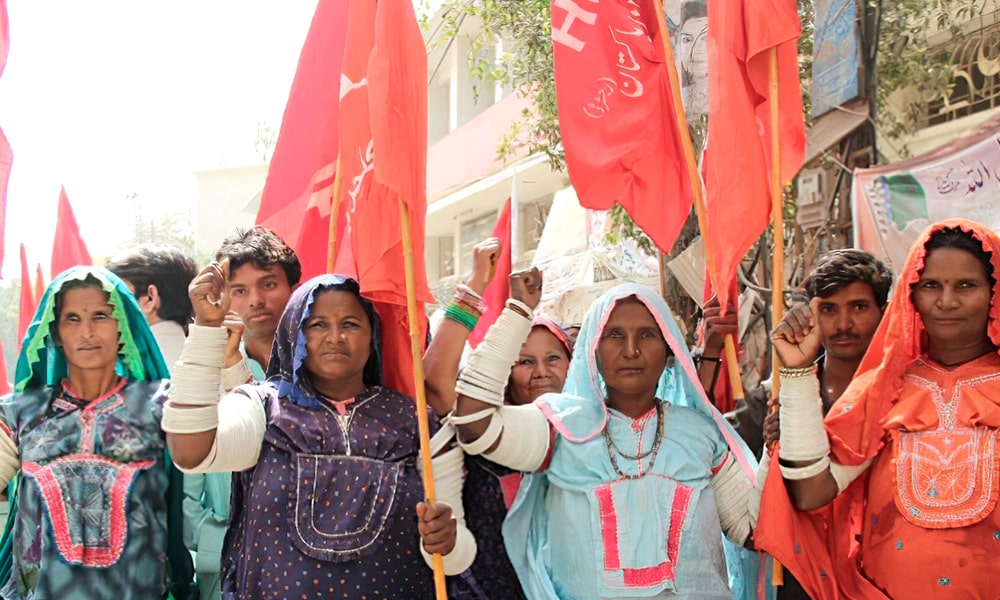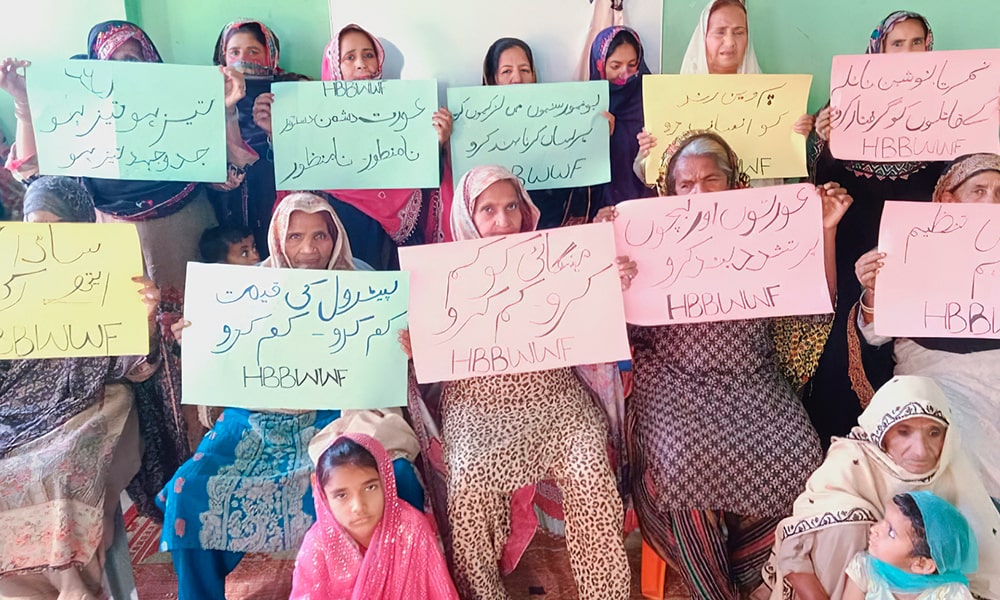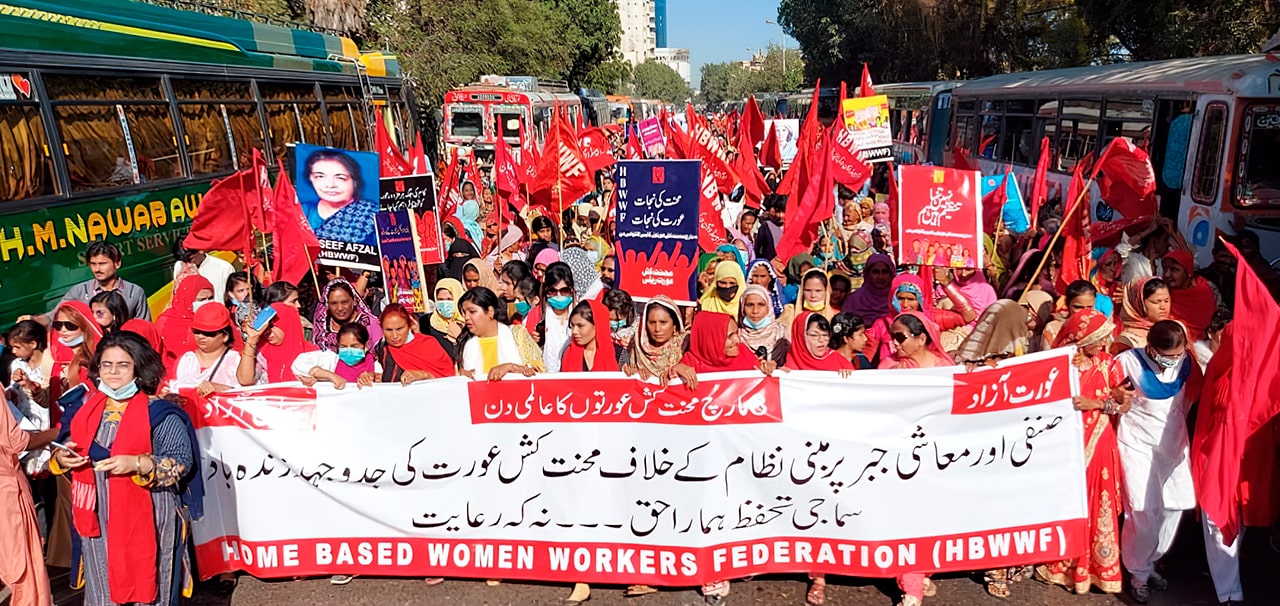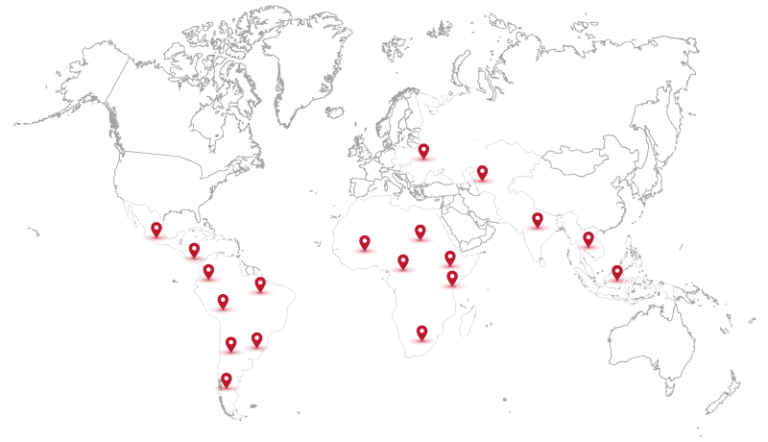As part of the 8th OECD Forum on Due Diligence in the Garment and Footwear Sector, HomeNet International (HNI) along with regional organisations, HomeNet South Asia, and HomeNet SouthEast Asia, Women in Informal Employment Organising and Globalising (WIEGO), HomeWorkers Worldwide and Traidcraft Exchange, held a side session on February 25, 2022, titled: “A chain is only as strong as its weakest link: Why EU mandatory due diligence legislation must include homeworkers.”
Janhavi Dave, HNI International Coordinator began by introducing the focus of the webinar: “Women homeworkers across the world and especially in South and Southeast Asia are the hidden labour force of the global garment and footwear supply chains. They don’t have contracts and factories do not keep official records of homeworkers to whom they subcontract.” She shared an explanatory video titled “Invisible Labour: Homeworkers in Global Garment Supply Chains” which shows how mainly women homeworkers sit at the bottom of these supply chains, taking up a range of jobs that contribute greatly to the end product. However, they remain invisible and command little bargaining power.
Dave went on to mention that in February 2022, over 100 companies and investors released a joint statement addressed to EU Policy makers. One of the five principles of the statement was that the due diligence obligation should extend across the full value chain. On February 23 the EU Commission adopted a proposal for a Directive, which includes references to due diligence obligations covering the full value chain. Although this is a step in the right direction, more can be done.
In Tirupur Home-based Workers Source More than 400 Brands
A question and answer session took place with two leaders from homeworker organisations. The first speaker was Viyakula Mary, Executive Director of SAVE, a non -profit organisation that carries out developmental programs for the socio-economically poor and marginalised communities in Tirupur, India. Mary spoke of the garment supply chains in Tirupur, considered the t-shirt factory of the world and about the homeworkers in these supply chains.
According to Mary, home-based workers in Tirupur source around 400 brands, including global and local companies. The workers receive orders from a minimum of 3 to 5 middle agents, which translates into extremely low pay and acute bargaining power. She went on to explain that they perform tasks such as checking garments, trimming, pruning unwanted threads, amongst others, while caring for their children and elders. To make matters worse, during the Covid-19 pandemic they became the most vulnerable community in Tirupur. Many factories shut down and movement was restricted. Even when the factories opened again, orders were reduced leaving them with little to no income to provide for their families.
Mary added that homeworkers in garment supply chains are not recognized by the law in India. Therefore, SAVE has worked hard to protect them by organising them in unions, having continuous dialogue with other supply chain stakeholders, subcontractors and factory management and some clothing brands. Also, they continuously lobby and advocate with the government. Additionally, counselling and support has also been provided for domestic violence and sexual harassment. Lastly, they’ve gone on to help register workers and agents’ passbooks so there will be transparency in the transactions the homeworkers are involved in.
Pakistan Sindh Province Legislation - Paving the Way for Homeworkers Globally
Zehra Khan is the founder and General Secretary of Home Based Women Workers Federation (HBWWF), the first ever trade union of HBWs in Pakistan, which has fought and worked towards the legislation which recognises homeworkers as workers in supply chains. According to Zehra, this law entitles home-based workers to labour rights and social protection. The struggle to achieve it took more than 12 years. They were victorious due to the constant efforts of raising awareness, organising homeworkers, and building pressure groups and on May 9, 2018, the legislation was approved.
The main feature of this legislation is that the extreme bottom of the supply chain workers are finally recognized by the law as workers. They can now go to any arbitrary committee to file complaints and even sue their employers if needed. Homeworkers are now eligible for social benefits; they can register for a social security scheme for which they can get benefits such as a pension. Additionally, they benefit from minimum wage and allocation of seed money for their welfare.
Why Human Rights Due Diligence Legislation Must Cover Homeworkers
Marlese von Broembsen, Law Programme Director of WIEGO, presented why human rights due diligence legislation must cover homeworkers. She began by talking about the Platform of Demands submitted by 12 homeworker organisations to the EU Commission as part of its consultative process, as well as an Open Letter to European Union Policy Makers drafted by 7 organisations from South and Southeast Asia garment producing countries, which raised two key arguments: that the EU Directive should cover all workers in all tiers of the chain – factory workers and subcontracted workers in workshops and at home – and the second set of arguments raises the issues of access to justice.
Amongst the multiple reasons for including homeworkers in the legislation, Marlese emphasised that if the EU Directive only includes factories, then it will ignore the real structure of the supply chain. She mentioned that in India, almost 90 % of garment sector workers are employed outside of the factories. Also, a survey of 340 garment factories in Delhi showed 58 % of surveyed factories outsource to homeworkers. Additionally, if all workers are not taken into consideration, then it will drive further informalization of work. She went on to explain that supporting homeworkers is a gender issue because 80 % of the workforce in the textile, garment and footwear sectors is female and women must juggle care work, along with casual low paid work by the piece.
To view Marlese von Broembsen’s complete presentation, click here.
Brands Should Incorporate Homeworkers in Due Diligence
Lucy Brill, Director of the international labour rights charity, Homeworkers Worldwide (HWW), shared the highlights of their work on homeworking within the leather footwear sector, where they found women homeworkers in many different countries performing labour-intensive hand-stitching work in their homes, producing high quality leather shoes whilst being paid on a piece rate. After this study came out a major brand collaborated with HWW and a local partner in India to map the conditions of homeworkers which had been disclosed by one of its suppliers, which gave way to a value chain mapping with a time and motion study to link the workers actual work and wages to minimum wage legislation.
Additionally, she shared the Hidden Homeworkers toolkit they developed with partners to help businesses (and the organisations working with them) improve transparency and working conditions for homeworkers within their supply chains. It is based on best practices, tools and learnings gathered from 16 of the foremost practitioners, including leading apparel and footwear retailers and civil society organisations, who have implemented due diligence and transparency mechanisms in homeworker supply chains.
To view Lucy Brill’s complete presentation, click here.
Watch the webinar here:
